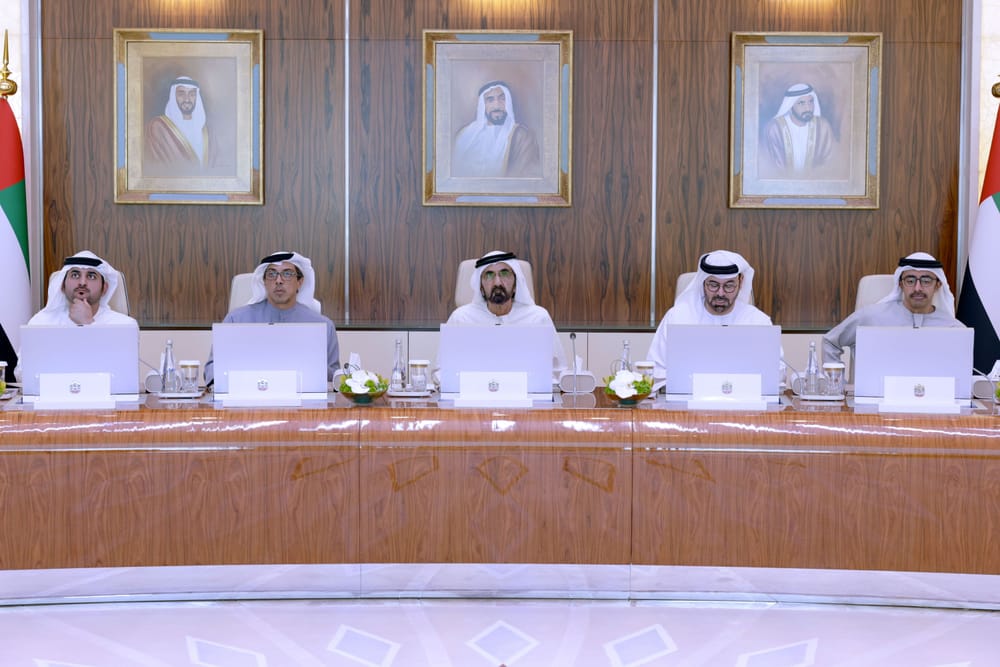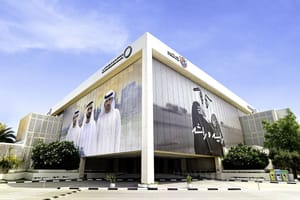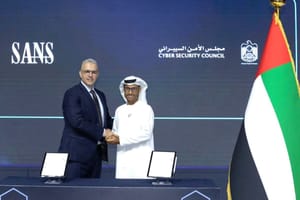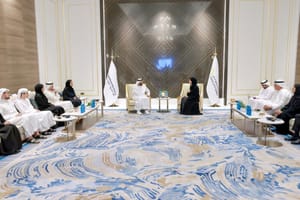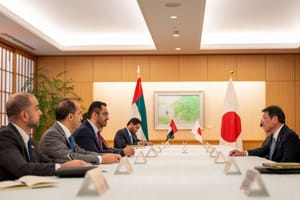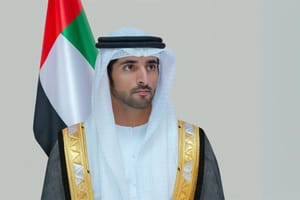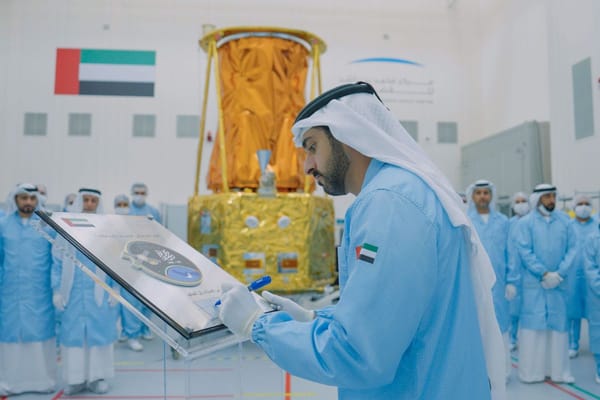His Highness Sheikh Mohammed bin Rashid Al Maktoum, Vice President, Prime Minister, and Ruler of Dubai, chaired the UAE Cabinet meeting at Qasr Al Watan, Abu Dhabi, alongside His Highness Sheikh Mansour bin Zayed Al Nahyan, H.H. Sheikh Maktoum bin Mohammed bin Rashid Al Maktoum, and H.H. Lt. General Sheikh Saif bin Zayed Al Nahyan.
Sheikh Mohammed announced the approval of the National Youth Agenda 2031, focusing on five pillars to empower youth economically, enhance their skills, consolidate national identity, boost community contributions, and elevate their international representation. Additionally, a new framework for classifying higher education institutions was approved to enhance education quality and transparency.
Sheikh Mohammed emphasized the UAE's dedication to advancing youth, protecting the environment, integrating global technologies, and enhancing higher education systems for a brighter future.
National Youth Agenda 2031
The Cabinet has greenlit the National Youth Agenda 2031, aiming to position young Emiratis as regional and global role models, bolstering their contribution to economic and social progress. The Agenda revolves around five key pillars: enhancing youth's economic role, fostering community engagement while upholding national values, driving global positive change, fostering technological proficiency, and ensuring optimum health and quality of life. It targets qualifying over 100 Emirati youth to represent the nation in global forums, providing suitable career pathways, and elevating UAE's quality of life ranking for youth.
Additionally, it prioritizes national identity and affiliation, streamlining access to basic services for youth, and doubling youth projects in promising sectors while enhancing academic and vocational qualifications aligned with future skills and market demands. The Agenda also entails launching the National Charter for Youth and an honorary medal for outstanding youth.
Priority in federal government jobs to Emirati applicants with 3 years of experience in the private sector
The Cabinet endorsed a decision granting priority in federal government job appointments to citizens with a minimum of three years' private sector experience. This move aims to integrate national expertise from the private sector into the federal government, enriching knowledge diversity and enhancing overall effectiveness and innovation. By valuing insights and practices from private sector companies, the decision aims to promote a broader dissemination of knowledge within government entities, fostering a more dynamic and efficient public sector.
Scholarship system in federal government higher education institutions
The Cabinet reviewed a new system for financing federal government higher education institutions on the basis of scholarships, with the aim of enhancing the quality of educational outcomes in these institutions and continuing alignment with the labor market and available career opportunities.
The new system operates by granting financial scholarships after reviewing and defining the number of new academic seat to be created, and the specializations required according to the needs of the labour market, using a predetermined mechanism.
National Framework for the Classification of Higher Education Institutions
The Cabinet approved a national framework to classify higher education institutions within the UAE, encompassing both public and private institutions.
This framework assesses and categorizes institutions based on national performance metrics in line with four primary dimensions: teaching quality and student life, employment and job market alignment, scientific research and innovation, and international collaboration.
Institutions are segmented into two major categories: research institutions and non-research institutions of higher education. They are further classified into one of four levels within each category. The objective of this framework is to raise the standard of educational institutions, promote the adoption of exemplary academic practices and foster an educational environment that improves both the quality of education and student life.
Accomplishments of the UAE Space Sector
The Cabinet reviewed the UAE Space Agency's accomplishments in 2023, highlighting the establishment of five Space Economic Zones to support SMEs in the sector with incentive packages. Achievements included the launch of the "Sirb" Satellite Programme, the formation of a national space industry alliance, and the Emirates Mission to the Asteroid Belt, positioning the UAE as the fourth country to send a mission to Venus and the asteroid belt. The Space Solutions Programme was initiated for climate change and food security, alongside the Space Academy project to support national space programs and human capital. The 2022 Space Economic Survey revealed a 6.61% increase in total sector spending, with government spending up by 12.7% and commercial spending accounting for 44.3%. Research and development spending surged by 14.8%, with a significant portion allocated to space exploration.
Guide for the Controls on the Use of Generative Artificial Intelligence Technologies in Government Work
The Cabinet sanctioned a comprehensive guide delineating controls and guidelines for the ethical use of generative artificial intelligence (AI) technologies within the UAE government. This guide aims to standardize best practices across sectors like education, healthcare, and media, fostering responsible AI application to bolster governmental efficiency. Key principles include data adequacy, application governance, stakeholder collaboration, user rights, data collection ethics, sustainability, and combating misinformation through a risk-based regulatory framework.
Furthermore, the Cabinet introduced the role of "Chief Executive Officer for Artificial Intelligence" across ministries and federal entities to spearhead strategic AI planning, promote best practices, and ensure AI integration and governance, bolstering innovation and the digital economy while nurturing individual AI competencies to uphold the UAE's technological leadership.
Regulation of Marketing Calls
The Cabinet sanctioned a decision to regulate marketing calls (cold calling) to safeguard consumer privacy, establishing guidelines for telemarketing practices, compliance obligations for companies, and penalties for violations, alongside facilitating coordination between federal and local authorities for effective enforcement. Additionally, technical regulations were approved to monitor product quantities in pre-packaged containers, enhancing domestic goods' quality and competitiveness while safeguarding consumer rights. Further decisions include regulations for virtual assets, Holy Quraan education centers, Islamic pilgrimage trips, and services by the Federal Authority for Identity, Citizenship, Customs, and Port Security. The Cabinet also extended insurance protection to GCC citizens working across GCC states and set employment guidelines for students to balance education and work commitments.
Higher Committee for Combating Commercial Fraud
The Cabinet approved the establishment of the Higher Committee for Combating Commercial Fraud to update policies, enhance coordination, and raise awareness. It also endorsed the restructuring of the UAE Council for Artificial Intelligence and the UAE Sustainable Fuel committee to advance eco-friendly technologies.
National Statistics Committee
The Cabinet endorsed the formation of the National Statistics Committee to improve data accuracy and reliability. It ratified agreements with India to promote investment and with South Korea for a Comprehensive Economic Partnership. The UAE will host international conferences, including the UAE University Annual International Law Conference and the Cryptocurrency Research Conference 2024. The Cabinet reviewed the success of hosting the 13th Ministerial Conference of the World Trade Organization, drawing significant participation and visitors.
News Source: Emirates News Agency
